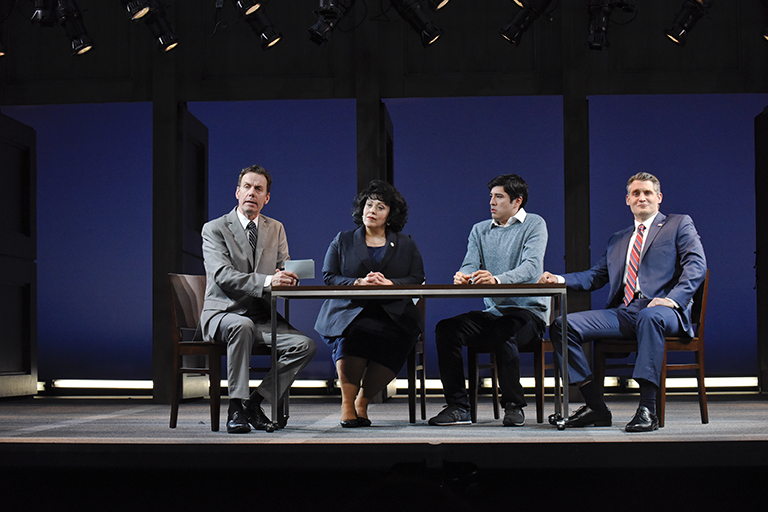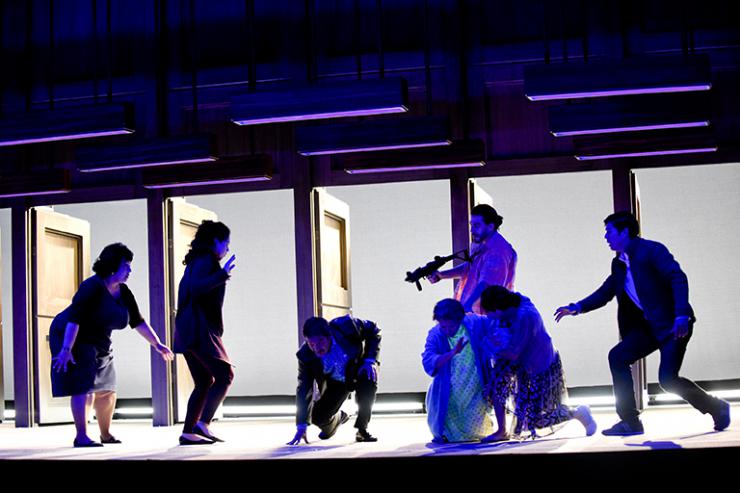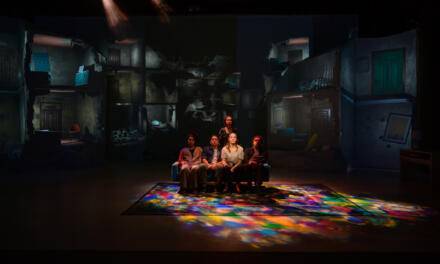David Lozano and Lee Trull’s critically acclaimed play Deferred Action is coming to Talento Bilingüe de Houston (TBH) in Houston, Texas from October 5-7, 2017, marking Cara Mía Theatre Co’s debut in Texas’ largest city. While Cara Mía tours its timely play about DACA and immigration reform to Texas and California audiences as part of its fall tour, perhaps, more importantly, the Dallas-based company brings a much-needed dose of Latinx theatre to Houston. Proceeds from the October 5 performance will benefit Hurricane Harvey Relief for undocumented families.
As I’ve previously written about on Café Onda and Arts + Culture Texas, Houston has a surprising lack of Latinx theatre on its stages. As the country’s fourth-largest city, Houston’s population of 2.3 million people is roughly 40% Latinx. When one factors in predominately Latinx suburbs such as Pasadena, the omission of Latinx representation becomes even more egregious.
Houston theatre offerings for the 2017-2018 season include a staged reading of Bernardo Cubría’s Neighbors: A Fair Trade Agreement by Horse Head Theatre and MECA, Charise Castro Smith’s Feathers And Teeth at Mildred’s Umbrella Theatre Company, Alvaro Saar Rios’ Luchadora at the University of Houston, and Stages Repertory Theatre’s inaugural Sin Muros Latina/O Theatre Festival in February 2018 featuring new work from Mando Alvarado, Bernardo Cubría, and Tanya Saracho, in addition to the world premiere of Josh Inocéncio’s solo show, Purple Eyes. Additionally, Gente de Teatro continues to present Spanish-language plays from Latin America and Spain, and the Alley Theatre’s El Zocálo Initiative in 2018 will feature Mexican company Gorguz Teatro’s production of Misa Fronteriza, bringing Latin American theatre to Houston audiences.
In conversation, this might seem like a healthy amount of Latinx theatre, but when compared to comparable cities such as Dallas and Chicago, the dearth of Latinx stories on stage becomes shocking. For this reason, companies such as Cara Mía Theatre Co. coming to Houston are even more noteworthy.
While Cara Mía has certainly had its highs and lows since Adelina Anthony founded the company in 1996, there is no doubt that the company has been a national leader on the Latinx theatre scene since at least their 2009 production of Crystal City 1969. Under the leadership of artistic director David Lozano, the company has grown exponentially and continues to push the art form forward in Dallas. Now, Cara Mía finds itself extending its reach across Texas before eventually presenting Deferred Action for three weeks at the Los Angeles Theatre Center’s Encuentro de las Américas. Speaking of the tour with Obed Manuel, David Lozano says: “What I think it can do for us is allow us to share our unique voice about telling stories that reflect our local political, social and cultural experiences with the country and, to a degree, the world. We’ll be able to further evolve our work by engaging Latinx from the entire western hemisphere.”
After receiving its world premiere in 2016 in a special collaboration between Cara Mía and Dallas Theater Center, Deferred Action has become even timelier than just a year ago. The play focuses on Javier Mejía, a Dreamer who arrived in the United States as an undocumented minor and now finds himself entangled in immigration laws and the uncertainty of new presidential policies. The play by all means and purposes should have become quickly dated. And then November 8, 2016, happened and the plight of Dreamers and undocumented people in the United States worsened. Things escalated again in early September when Donald Trump did not renew DACA, leaving the lives of nearly 800,000 legal residents in limbo. Under the current regime, theatre such as Deferred Action remains increasingly necessary. This is a play that needs to be seen by people from across both sides of the aisle. As Roxanne Schroeder-Arce and I wrote last year, “Democrats. Republicans. Politicians. Activists. No one is left unscathed.”

Chamblee Ferguson, Christie Vela, Ivan Jasso, and Michael Brusasco in Deferred Action. Photo by Karen Almond.
So what is Deferred Action?
Deferred Action is short for Deferred Action for Childhood Arrivals (DACA). This executive action from the Obama administration grants a work permit and reprieve from deportation for young people who were brought to the United States under the age of sixteen and were not over the age of thirty-one as of June 2012. While DACA certainly has been fundamental to helping numerous young immigrants participate in society, there are still things that they will never have, such as a social security number or, as Javier notes in the play, the right to vote. DACA, therefore, grants many privileges and cultural citizenship, but nonetheless still relegates childhood arrivals to a second-tier status. The recipients of DACA, such as the ones seen in Deferred Action, are often called Dreamers—children who were brought to the United States, have been educated in this country, largely identity as “American,” yet face the threat of deportation to their country of birth. They grow up speaking English, attend school, work, pay taxes, but are still undocumented and denied the privileges of full citizenship.
Deferred Action must be renewed every two years and, thus, does not result in citizenship or even legal residency. While President Obama passed an executive order to protect upwards of five million Dreamers in 2014, the 2016 presidential election proved detrimental to this momentum. Obama’s executive order could disappear within six months which would put many undocumented young people in danger of deportation to countries in which they were born, but that they potentially have never known. (For more on DACA and Deferred Action, see “Demanding Action and Attention to Latina/O Theatre in Dallas.”)

Cast members of Deferred Action. Photo by Karen Almond.
While our current president and Congress decide the fate of the roughly 800,000 Dreamers, Cara Mía has begun its Texas regional tour of Deferred Action and will present the Los Angeles premiere of the play in November. Speaking of the importance of touring Deferred Action to Houston, Lozano says,
“We had to re-evaluate the need for the play in Houston. After Harvey, did the Latinx community need a touring production at this moment? After talking with our co-presenter Talento Bilingüe and our Houston sponsor, Latino Texas PAC, we decided to dedicate proceeds of the opening night performance to undocumented families who were hit hard by the storm. This made the play relevant again in a city that is still struggling.”
By nearly any measure, Deferred Action is more relevant today than when the play premiered, just 18 months ago. “I’m glad we are touring Deferred Action at this moment. As in the play, our real-life political circumstances may lead to new immigration laws written by Republicans,” admits Lozano. “These are challenging circumstances for DACAmented youth, adults, and their families. Do they, and do we as American citizens, accept legislation from the party led by President Trump? It’s a hell of a conundrum.”
Deferred Action is a critical play that sheds light on the uncertainties facing undocumented peoples in the United States. Audiences in Houston and across the country—especially those that benefit from U.S. citizenship and Whiteness—must bear witness to theatre such as Deferred Action to continue a conversation about immigration. Cara Mía has demonstrated what they will do in the face of adversity. What will we do?
This post was written by the author in their personal capacity.The opinions expressed in this article are the author’s own and do not reflect the view of The Theatre Times, their staff or collaborators.
This post was written by Trevor Boffone.
The views expressed here belong to the author and do not necessarily reflect our views and opinions.

















